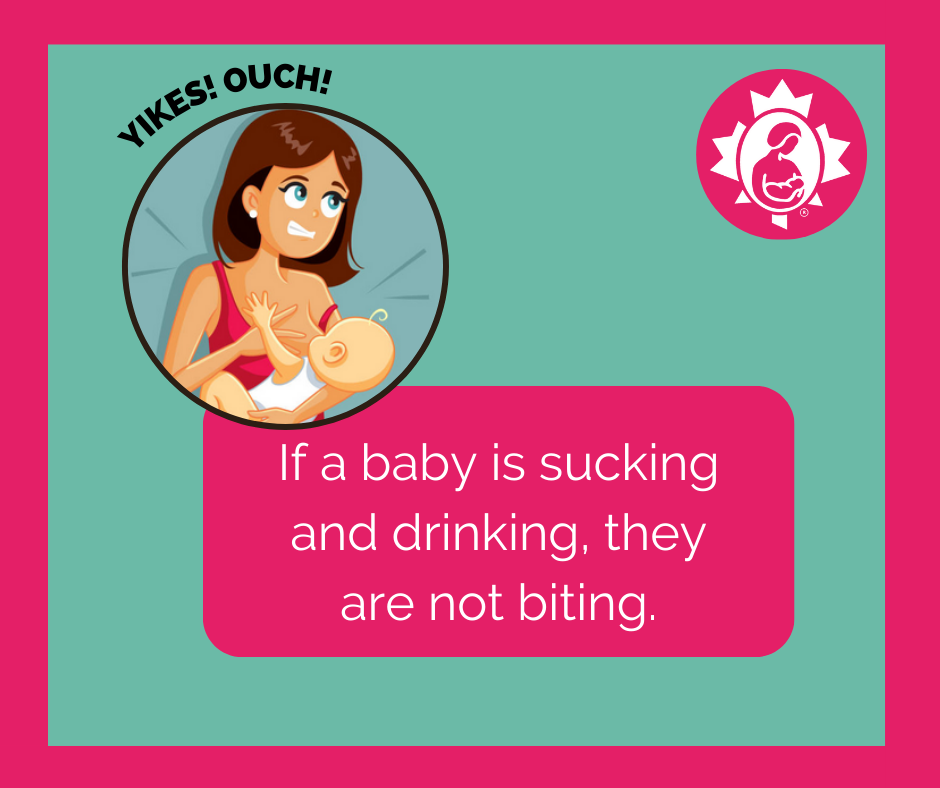
Some babies never bite mom, others may do it once or twice and the occasional baby seems to go through a biting phase. This can happen before or after your baby gets some teeth. Once there are teeth, a bite can be an attention getting (and unpleasant) surprise. Remember, your baby is not trying to hurt you.
Babies with teeth have been breastfeeding for thousands of years. Although teething can cause your baby discomfort which may lead to some biting, babies can also quickly learn that they must not bite mom if they want to nurse. If a baby is sucking and drinking, they are not biting.
The range of normal in the teething timeline is pretty wide. Some babies begin to get their first teeth around six months. Others may not get any until closer to one year. Babies may experience discomfort from the erupting teeth for a month or two before the tooth is visible above the gum line. Some babies do not seem to experience any discomfort at all.
Medications for teething babies which numb the gums should be used with caution. The numbing agent works not only on the gums but also on the tongue and throat surfaces. These may make it difficult for your baby to latch on properly.
Why do babies bite the breast that feeds them?
The reasons can include teething, earaches, stuffy nose, allergies and positioning. Some babies’ jaws tighten involuntarily just as they fall asleep. Sometimes there is no reason that can be figured out. Remember that babies don’t understand that clamping their jaw or biting hurts you. While your urge to yelp may be strong, try to work towards a gentle solution.
Some ideas to try include:
- First check your baby’s position. Babies nurse best with their heads slightly tilted back so the chin is forward rather than tucked into the chest. As your baby grows, your old nursing position may need a slight adjustment. Check to make sure it isn’t putting your baby in a tucked chin position.
- Provide safe cold items for chewing between nursings to help the sore gums.
- Take your baby off as soon as they bite or clamp their jaw and set them down gently on the floor. Firmly, but quietly, say “no biting”. Wait a minute or two (an eternity in the baby’s world). Then pick them up and offer to nurse. This tells your baby that biting will end the nursing session. If they want to nurse then they cannot bite.
- Another tactic is to pull your baby in closer to the breast when they bite. This sounds counterintuitive but pulling your baby in close makes it harder for them to breathe. This encourages your baby to open their mouth wide. To be clear, this is a quick pull into the breast.Your baby’s nose is buried into your breast for only a second or two. This tactic works best with babies under six months. They start to associate biting with being unable to breathe and will quickly stop clamping down.
- A baby who tends to bite at the start of a feeding may be impatient for the milk to start flowing. Some breast compressions before you latch on or as they are taking those first few sucks may speed up the first milk release.
- Babies can’t bite when they are actively nursing. Your baby’s bottom teeth are covered by the tongue. The top teeth do rest on the breast and may, at times, leave small indentations in the breast. The work of breastfeeding is done by the lower jaw and tongue. The top teeth are not moving on the breast. If your baby is clamping down, you will want to pay close attention to the tongue position. If you feel it shifting, you may want to say their name or rub their back to distract them from biting. You can also quickly put a finger between their jaws and take them away from the breast as the feeding is finishing, before they bite.
- Extra vigilance is the best plan for the baby who clamps their jaw as they fall asleep. They are truly unaware of what they are doing. Stopping the nursing session a bit sooner may work. Or you can keep a finger ready to slip between their gums as your baby drops into a deep sleep.
- Avoid using pacifiers and bottles if your baby is doing a lot of clamping down. It is hard for your baby to understand why one sucking source doesn’t react to being chewed on and the other (mom) shrieks when they do it.
- Biting rarely involves skin damage. If it does, just wash the area with soap and water and use a bit of antibiotic cream.
If you are having problems with a biting baby and these tips haven’t helped, you can contact a La Leche League Leader to brainstorm solutions that will work for you and your baby. Also consider attending a La Leche League meeting to learn how other mothers have dealt with biting.
Please consider supporting LLLC.
Updated 2022
